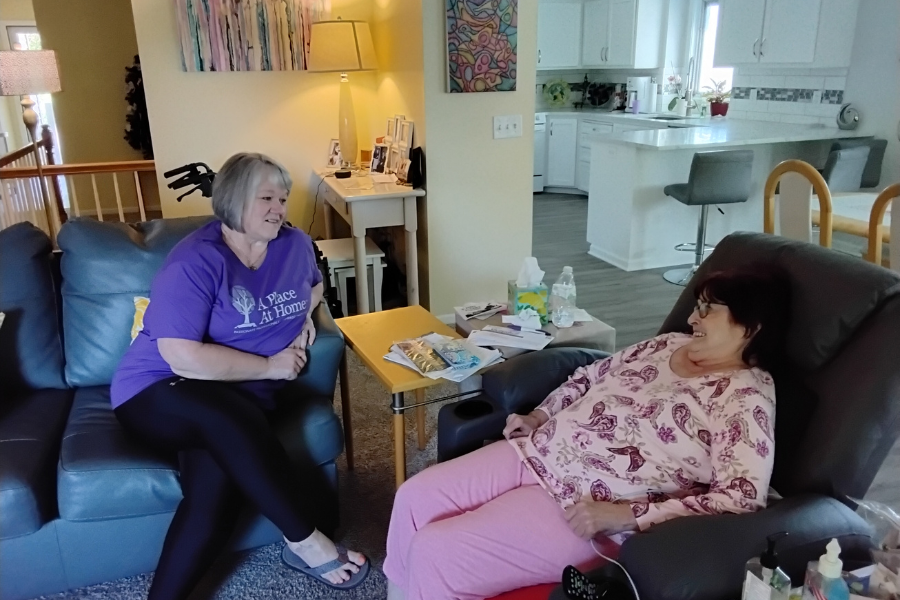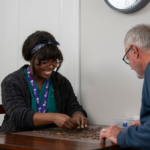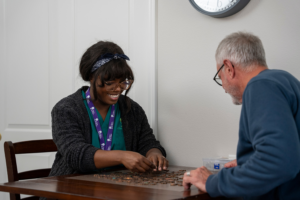
As we age, our social connections become even more critical to our overall well-being. From reducing feelings of loneliness to improving mental and physical health, maintaining strong relationships and engaging in social activities are vital for seniors. The good news is, it’s never too late to build new connections and strengthen the ones you already have. Let’s explore the incredible benefits of social connections, share some easy ways to stay socially active, and learn how home care and recreational therapy can help!
The Benefits of Social Connections for Seniors
Improved Mental Health
One of social connection’s most powerful and well-documented benefits is its profound impact on mental health. As we age, we may face life changes such as retirement, losing loved ones, or physical limitations that can lead to isolation. However, maintaining meaningful relationships and staying socially active can protect against many of these challenges.
Regular social interactions—whether it’s chatting with a friend, participating in a group activity, or even having a friendly exchange with a neighbor—can significantly reduce the risk of mental health conditions like depression and anxiety. When seniors feel connected to others, they’re less likely to dwell on negative thoughts or feel overwhelmed by life’s stresses.
A strong support system also provides a crucial sense of safety and emotional security. Knowing someone is there to listen, understand, and care can be incredibly comforting. Social connections are not just a nice-to-have—they’re essential for maintaining a healthy mind. They remind seniors that they are valued, loved, and part of a community, which can lead to greater happiness and overall life satisfaction.
Enhanced Cognitive Function
Staying socially connected doesn’t just lift our spirits—it also keeps our minds sharp. Engaging in regular conversations, participating in group activities, or simply spending time with others helps stimulate the brain, encouraging it to stay active and alert. Much like physical exercise strengthens the body, mental stimulation strengthens the brain.
When seniors socialize, they are often challenged to think on their feet, remember details, follow conversations, and express themselves clearly. These small yet important mental tasks add up over time and contribute to improved memory, sharper thinking skills, and better overall cognitive health.
Studies have shown that people who maintain strong social connections are at a lower risk of developing cognitive decline and conditions like Alzheimer’s disease or other forms of dementia. Social activities—like playing cards, discussing current events, or even sharing stories—encourage curiosity, critical thinking, and learning, all of which are vital for a healthy brain.
Social interaction also helps reduce stress, which negatively impacts memory and concentration. By lowering stress levels and increasing mental stimulation, social engagement creates a brain-friendly environment that supports long-term cognitive wellness.
Better Physical Health and Healing
Social connections have a powerful impact on physical health, contributing to lower rates of chronic illnesses like heart disease, high blood pressure, and even diabetes. Regular interaction with others can also strengthen the immune system by reducing stress hormones and boosting the body’s natural defenses. Simply put, people who feel connected tend to be healthier and more resilient against illness.
In addition, social support plays a vital role in recovery. Whether healing from surgery, managing an illness, or coping with a traumatic event, having a reliable support system can significantly speed up the healing process. Encouragement from loved ones and caregivers helps reduce anxiety, promotes a more optimistic outlook, and increases motivation to follow through with medical care and lifestyle changes. Together, these emotional and practical supports create the ideal environment for healing and long-term wellness.
Ways to Increase Social Connections
- Join a Local Senior Center
- Many senior centers offer a variety of activities such as arts and crafts, fitness classes, and social events. It’s a great way to meet new people and stay active.
- Take Up a Hobby or Class
- Whether learning a new language, painting, gardening, or cooking, hobbies are an excellent way to connect with others with similar interests.
- Volunteer
- Giving back to your community is a fulfilling way to meet people and make a difference. Volunteering offers both social interaction and a sense of purpose.
- Use Technology to Stay Connected
- Video calls, social media, and messaging apps can help seniors stay connected with loved ones and join online communities. Regular virtual check-ins with family or friends are an easy way to stay in touch.
- Join Exercise Groups or Walking Clubs
- Participating in group exercise or walking clubs allows you to stay healthy while connecting with others. It’s a great way to get moving and make new friends!
- Invite Friends or Family Over for Meals
- Sharing a meal is a simple but powerful way to stay socially connected. Whether hosting a family dinner or enjoying coffee with a friend, these moments help strengthen bonds.
How Home Care Can Help with Social Connections
Home care can be an invaluable resource for seniors who want to remain socially active while receiving the support they need. Caregivers do more than assist with daily tasks like bathing, dressing, or meal preparation—they also offer meaningful companionship. For many seniors, the consistent presence of a compassionate caregiver can provide much-needed social interaction, helping to reduce feelings of loneliness and isolation.
Caregivers often engage in friendly conversation, play games, share meals, or assist with hobbies, creating moments of connection throughout the day. They can also accompany seniors on community outings, family visits, or social events, providing the confidence and support needed to stay involved. In addition, caregivers can help maintain ties with loved ones by facilitating phone or video calls, sending cards, or even helping navigate social media. With the right caregiver, home care becomes more than support—it becomes a lifeline to the outside world and a source of joy and connection.
Other Resources
Recreational Therapists – They are available to visit seniors in their homes. These therapists can design engaging, tailored activities that foster social interaction and creativity, from games and crafts to light exercises and memory-building activities. Recreational therapy promotes mental and emotional well-being, making it an excellent tool for maintaining social connections in the comfort of home.
Virtual Clubs or Classes – Many organizations offer online book clubs, art classes, fitness sessions, or faith-based gatherings that allow seniors to engage with others who share their interests.
Faith-Based Outreach – Churches, synagogues, or spiritual groups often have volunteer ministries that call, visit, or deliver messages of support to homebound members.
Interactive TV or Radio Programs – Some local senior centers or nonprofits host interactive programs where seniors can call in, respond to prompts, or participate in live shows.
Final Thoughts
Social connections are essential at every stage of life, but they become especially meaningful as we age. For seniors, maintaining strong relationships and engaging in regular social interaction can improve mental health, enhance physical well-being, and facilitate faster recovery from illness or injury. Beyond the health benefits, staying socially connected brings a deep sense of purpose, belonging, and joy.
No matter your age or circumstances, it’s never too late to nurture or create new relationships. Whether through family, friends, neighbors, or caregivers, a meaningful connection is within reach. Engaging with others can even open the door to learning something new—whether it’s a hobby, a skill, or a fresh perspective. These new experiences can spark curiosity and bring unexpected joy. With the right support, seniors can continue to enjoy rich, fulfilling lives filled with laughter, companionship, and the comfort of knowing they’re not alone.


